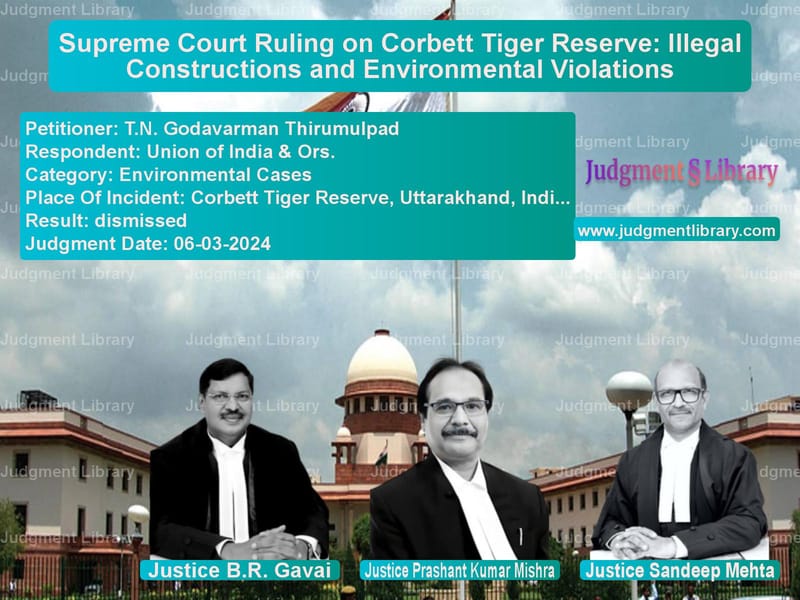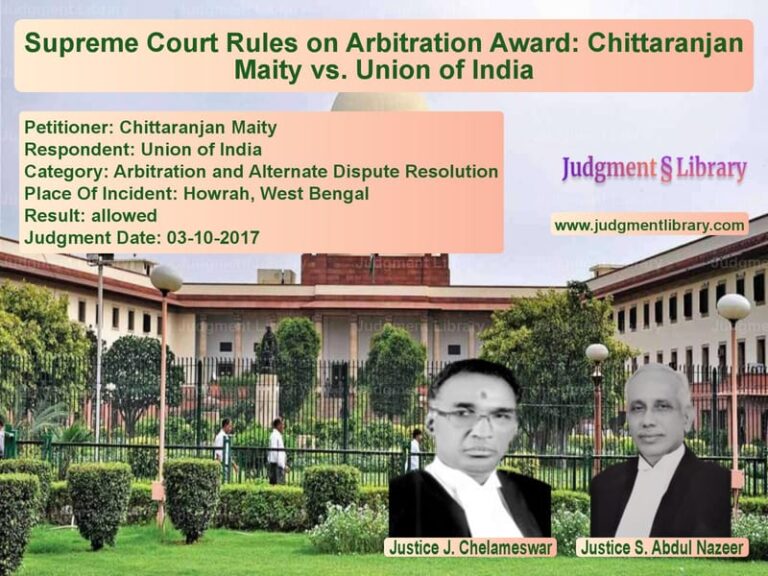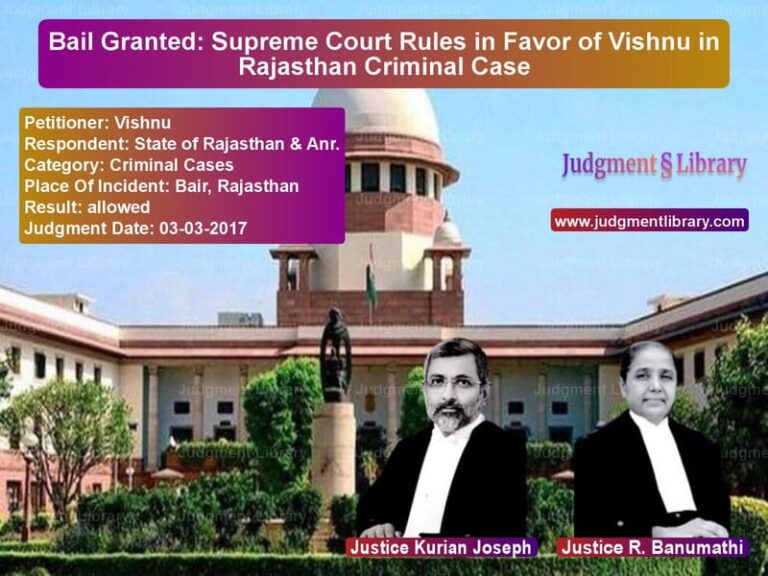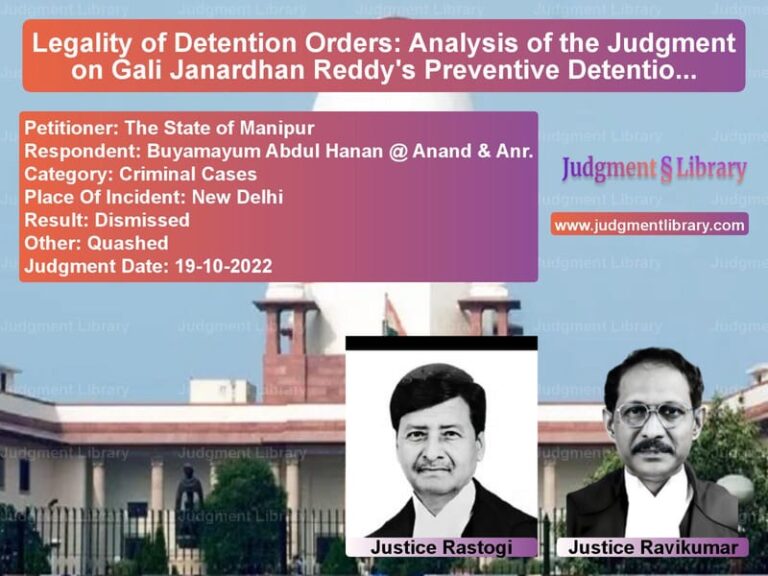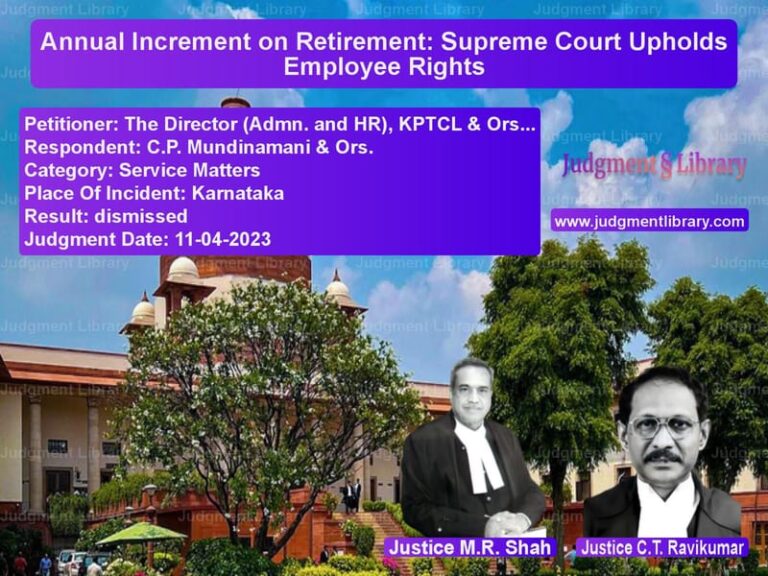Supreme Court Ruling on Corbett Tiger Reserve: Illegal Constructions and Environmental Violations
The Supreme Court of India has delivered a landmark judgment in the case of T.N. Godavarman Thirumulpad v. Union of India & Ors., addressing severe environmental violations in the Corbett Tiger Reserve. The case revolved around illegal constructions, unauthorized felling of thousands of trees, and the establishment of a Tiger Safari within protected areas without necessary approvals.
The case was brought before the court by environmental activist Gaurav Kumar Bansal, who alleged that illegal constructions and deforestation were being carried out in violation of the Wildlife Protection Act, 1972, and other environmental laws. The Uttarakhand High Court had earlier taken suo motu cognizance of media reports highlighting these illegal activities, leading to a comprehensive Supreme Court review.
Petitioners’ Arguments
The petitioner, Gaurav Kumar Bansal, argued that:
- The construction of bridges, walls, and roads within the core breeding habitat of the Corbett Tiger Reserve was being carried out without approval from competent authorities.
- The illegal felling of over 6,000 trees had caused irreversible damage to the biodiversity, flora, and fauna of the reserve.
- The Wildlife Protection Act, 1972, strictly prohibits any activity that disrupts protected areas without proper approvals.
- Despite previous court orders directing the authorities to take corrective action, no substantial steps had been taken.
- Public trust doctrine mandates that forest land and wildlife must be preserved for public good rather than being exploited for commercial interests.
Respondents’ Arguments
The Government of Uttarakhand and the National Tiger Conservation Authority (NTCA) defended their actions, stating:
- The Tiger Safari was being established under guidelines issued in 2016 and had received necessary approvals from NTCA and the Central Zoo Authority (CZA).
- All illegal constructions had been demolished, and debris had been cleared.
- Disciplinary action had been initiated against forest officials found guilty of approving unauthorized construction.
- The number of trees felled was exaggerated, and the state government contested the findings of the Forest Survey of India (FSI) report, which estimated the loss at over 6,000 trees.
- All constructions were carried out to promote eco-tourism and were in line with national conservation policies.
Supreme Court’s Observations
The Supreme Court made several critical observations:
- Illegal construction and deforestation: The court noted that large-scale unauthorized deforestation had taken place within the Corbett Tiger Reserve, violating multiple environmental laws.
- Public Trust Doctrine: The court reiterated that forests and natural resources belong to the public and must be preserved for future generations.
- Violation of legal procedures: The court found that the state government failed to follow due process in approving construction projects, leading to environmental degradation.
- Need for ecological restitution: The court emphasized that restoration efforts must be undertaken to reverse environmental damage and ensure that no such violations occur in the future.
Key Judicial Remarks
The Supreme Court, in its ruling, observed:
“The tiger perishes without the forest, and the forest perishes without its tigers. The concept of Tiger Reserves and National Parks is that the fauna must be permitted to reside in their natural habitat and not be confined to artificial enclosures for tourism.”
On illegal constructions, the court stated:
“Prima facie, we do not appreciate the necessity of having a zoo inside Tiger Reserves. The purpose of a Tiger Reserve is to protect tigers in their natural habitat, not to create controlled enclosures for tourism benefits.”
Final Judgment
The Supreme Court issued the following key directives:
- All construction activities within Tiger Reserves, National Parks, and Wildlife Sanctuaries must be halted immediately.
- The Central Bureau of Investigation (CBI) was directed to investigate officials responsible for illegal activities and take appropriate action.
- The Government of Uttarakhand was ordered to relocate the rescue center closer to the Tiger Safari to ensure proper rehabilitation of injured and orphaned tigers.
- The state must conduct an environmental assessment to quantify the damage caused and implement restoration measures.
- Resorts and commercial activities around protected areas should be regulated to prevent further harm to the environment.
Conclusion
This judgment reaffirms India’s commitment to environmental conservation and strict enforcement of wildlife protection laws. The court’s ruling serves as a warning against illegal encroachments into protected forests and underscores the need for responsible tourism that prioritizes ecological balance over commercial interests.
Petitioner Name: T.N. Godavarman Thirumulpad.Respondent Name: Union of India & Ors..Judgment By: Justice B.R. Gavai, Justice Prashant Kumar Mishra, Justice Sandeep Mehta.Place Of Incident: Corbett Tiger Reserve, Uttarakhand, India.Judgment Date: 06-03-2024.
Don’t miss out on the full details! Download the complete judgment in PDF format below and gain valuable insights instantly!
Download Judgment: t.n.-godavarman-thir-vs-union-of-india-&-ors-supreme-court-of-india-judgment-dated-06-03-2024.pdf
Directly Download Judgment: Directly download this Judgment
See all petitions in Environmental Cases
See all petitions in Public Interest Litigation
See all petitions in Legal Malpractice
See all petitions in Judgment by B R Gavai
See all petitions in Judgment by Prashant Kumar Mishra
See all petitions in Judgment by Sandeep Mehta
See all petitions in dismissed
See all petitions in supreme court of India judgments March 2024
See all petitions in 2024 judgments
See all posts in Environmental Cases Category
See all allowed petitions in Environmental Cases Category
See all Dismissed petitions in Environmental Cases Category
See all partially allowed petitions in Environmental Cases Category

